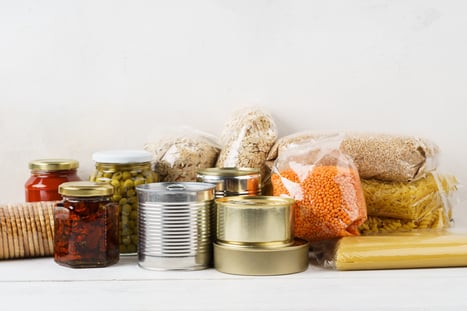 1. Stock up on nutritious foods from all food groups.
1. Stock up on nutritious foods from all food groups.
Think shelf-stable or frozen foods. Shelf-stable, nutrient-packed options include whole grain rice, chickpea- or lentil-made pastas, tuna, beans, nuts, legumes, protein pancake mixes, oats, nut butter, protein bars, low-sodium canned vegetables, and canned fruit in water. Frozen foods include pre-frozen bags of fruits, vegetables, and Greek-yogurt bars. Fresh options that can be frozen include sliced bananas, chicken, turkey, beef, seafood, bread, and tortillas. Eggs are also a great fresh option that keep well in the fridge for 3 weeks.
2. Fuel your body by eating regular, nutritious meals and snacks.
This will help to meet your caloric, vitamin, and mineral needs.
3. Stay hydrated
Drinking at least half your weight in ounces. If you have a fever, you will want to drink much more.
4. Have a menu plan
In case you do become quarantined or are socially distancing yourself, the plan should include enough daily meals and snacks to meet each family member’s caloric needs for 4-6 weeks. When planning those meals, try to incorporate all food groups into each day (vegetables, fruits, grains, dairy, and protein) and plan each portion size. Here is an example for 1 person:
- Breakfast: ½ cup oats with ½ cup berries (use frozen), 2 tbsp peanut
butter, and 1 tbsp chia seed - Snack: 1 granola bar with 1 hard-boiled egg
- Lunch: Stir fry (use low-sodium canned vegetables or frozen vegetables,
brown rice, and canned or frozen meat of choice) - Snack: 1 peanut butter and jelly sandwich (freeze bread, then unfreeze
a loaf for each week) with 1 serving baked chips. - Dinner: ¾ cup chickpea pasta served with ¼ cup tomato sauce, 1 cup
steamed vegetables (use frozen vegetables or fresh vegetables with a
longer fridge life), and ¼ cup cheese (freeze shredded cheese then
unfreeze as needed) - Dessert: 1 frozen yogurt bar
5. Seek community resources as needed. Many communities are coming together to help people obtain food. For Indy and surrounding communities, visit https://www.indy.gov/activity/covid-19-food-support , for food support initiatives.
If you have any other questions or concerns, please feel free to contact our Registered Dietitian, Sabrina Goshen by e-mail at SGoshen@nifs.org.

